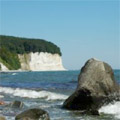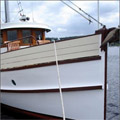Archiv für die Kategorie „Meeresschutz“
Frisches Wasser und die Zukunft der Ozeane wird Forschungsschwerpunkt
Wasser als wichtiger Faktor im Ökosystem und als Lebensmittel Nr. 1 spielt bei der Umweltforschung der EU weiterhin eine große Rolle. Im Jahr 2013 will die EU Forschungsprojekte im Bereich Umwelt mit 330 Mio. € fördern. 98 Mio. € davon sollen davon in die Förderung von Forschungsvorhaben in den Bereichen Frischwasser und Wasserressourcen fließen. 155 Millionen € sind für die Forschungspriorität „Der Ozean von morgen“ reserviert. Diese Gelder sollen zur Verbesserung der Nachhaltigkeit im marinen Sektor eingesetzt werden.
Mitteilung des Bundesministeriums für Bildung und Forschung:
Die Europäische Kommission hat die letzte Ausschreibungsrunde im Rahmen des 7. EU-Forschungsrahmenprogramms (7. FRP) veröffentlicht. Mit einem Fördervolumen von insgesamt 8,1 Milliarden € für Forschungsprojekte und -ideen ist diese Ausschreibungsrunde die bisher höchstdotierte im 7. FRP und nimmt den Hauptteil des EU-Forschungshaushalts 2013 von 10,8 Milliarden € ein.
Die Aufforderungen zur Einreichung von Vorschlägen umfassen eine große Bandbreite. Sie reichen von thematischen Forschungsprioritäten wie „Der Ozean von morgen“ (155 Millionen €), über „Intelligente Städte und Gemeinden“ (365 Millionen €) bis hin zu Förderprioritäten rund um die digitale Agenda im Bereich Informations- und Kommunikationstechnologien. Darüber hinaus finden sich auch Maßnahmen zur Intensivierung der Forschermobilität und Laufbahnentwicklung – die sogenannten Marie-Curie-Maßnahmen (963 Millionen) und Einzelzuschüsse des Europäischen Forschungsrats (1,75 Milliarden €) im Bereich der Pionierforschung. Für kleine und mittlere Unternehmen (KMU) steht ein Budget von ca. 970 Millionen € zur Verfügung.
Neu ist die Initiative für „Lehrstühle im Europäischen Forschungsraum (EFR)“, die auf eine breitere Verteilung der Spitzenforschung in Europa abzielt. Mit einem Budget von 12 Millionen € sollen insgesamt fünf EFR-Lehrstühle unterstützt werden, die an Universitäten oder anderen förderfähigen Forschungsinstitutionen in weniger entwickelten Regionen sitzen.
Das 7. FRP hat seit seinem Start 2007 bisher erfolgreich rund 19 000 Projekte mit insgesamt über 79 000 Beteiligten (Universitäten, Forschungsorganisationen und Unternehmen) in allen EU-Mitgliedstaaten gefördert.
Das EU-Büro des BMBF bietet Ihnen hier eine Zusammenstellung aller aktuellen thematischen Arbeitsprogramme aus dem Bereich Kooperation an. Per Stichwortsuche können sie überprüfen, in welches Thema Ihre Projektidee passen könnte. Alle ausschreibungsrelevanten Unterlagen stehen auf dem Teilnehmerportal („Participant Portal“) der Europäischen Kommission zur Verfügung. Weitergehende Informationen zur Antragstellung erhalten Sie auf unseren Internetseiten und über die einzelnen zuständigen Nationalen Kontaktstellen in Deutschland.
Auszug aus Pressemitteilung der Europäischen Union vom 09.07.2012 in englischer Sprache:
What is being done for the environment?
Oceans of the future, with a budget of around €155 million, will support sustainable growth in the marine and maritime sectors. More than 90% of marine biodiversity remains unexplored, offering a huge potential for discovery of new species and applications derived from biotechnologies. This is foreseen to generate 10% annual growth for this sector. At the same time, oceans are a finite resource for us all that need managing in a sustainable way.
Innovative technological solutions to address the challenge of managing fresh water resources will be supported with €98 million of funding. Water, as well as being essential for life, is a key raw material for our economies and a sector of growing importance. With turnover of about €80 billion a year, it is an important source of growth and jobs. This is why the Commission’s Water Blueprint, expected to be adopted in November 2012, is significant. Following up on that, some €40 million will be devoted to a Water European Innovation Partnership in 2013. Enhanced investment on research and innovation is critical for the European water industry to consolidate its position in the global market
In addition, €75 million is dedicated to maintaining a sustainable supply of raw materials to the EU for its industry and society as a whole. Decreasing the EU’s dependency on imported resources will lead to a greener economy while fostering more sustainable consumption and production patterns.
With a budget of €358 million, the 2013 work programme also promotes efficiency in the processing of biological resources, to produce safe and plentiful food, and bio-based products and processes. We can build a bio-resource efficient Europe by ensuring a sustainable primary production from our land, forests and oceans, while reducing waste. A better use of biotechnological processes in the industry and energy sectors could reduce greenhouse gas emissions by up to 2.5 billion tonnes of CO2 per year.
Die gesamte Pressemitteilung der Europäischen Union in englischer Sprache:
MEMO
Brussels, 9 July 2012
Questions and answers on FP7 2013 work programme
What is being financed?
The EU will fund research that addresses key challenges facing Europe. For example, investment in research to preserve oceans and water, make better use of raw materials, develop smart cities and tackle issues such as improving the delivery of public services, brain research and anti-microbial resistance. Funding will also go to high-risk/high-gain „frontier research“ in all domains of science through European Research Council grants and to support individual researchers‘ careers through Marie Skłodowska-Curie Actions.
How does investment in R&I help tackle the economic and financial crisis?
There will be no solution to the crisis without growth. There is evidence to suggest that, in general, Member States that traditionally invested more in R&D and education weathered the recent economic turmoil better. Investments in R&D and education increase the chances to smooth the adverse impact of the crisis while building a basis from which to bounce back quicker when recovery takes hold. That is why EU leaders took a collective decision (February 2011 European Council) to prioritise sustainable growth-friendly expenditure in areas such as research and innovation, education and energy.
Why are taxpayers funding R&D at EU level?
Some research is both very expensive and needs to be done on a very large scale to provide meaningful results. It is crucial to maximise value for money. Doing certain research collaboratively at EU level avoids duplication and allows pooling of skills and existing knowledge, in ways that could not be achieved by purely national spending. For example, the European Metrology Research Programme (EMRP), set up in 2009, has brought together the national metrology research plans of 22 countries.
EU research funding generates enormous added value for Europe. €1 of EU Framework Programme funding leads to an increase in industry added value of between €7 and €14. The expected long-term macro-economic impact of the current Seventh Framework programme amounts to 900,000 jobs, of which 300,000 in research, and an extra 0.96 percent of GDP.1
What is being done for the environment?
Oceans of the future, with a budget of around €155 million, will support sustainable growth in the marine and maritime sectors. More than 90% of marine biodiversity remains unexplored, offering a huge potential for discovery of new species and applications derived from biotechnologies. This is foreseen to generate 10% annual growth for this sector. At the same time, oceans are a finite resource for us all that need managing in a sustainable way.
Innovative technological solutions to address the challenge of managing fresh water resources will be supported with €98 million of funding. Water, as well as being essential for life, is a key raw material for our economies and a sector of growing importance. With turnover of about €80 billion a year, it is an important source of growth and jobs. This is why the Commission’s Water Blueprint, expected to be adopted in November 2012, is significant. Following up on that, some €40 million will be devoted to a Water European Innovation Partnership in 2013. Enhanced investment on research and innovation is critical for the European water industry to consolidate its position in the global market
In addition, €75 million is dedicated to maintaining a sustainable supply of raw materials to the EU for its industry and society as a whole. Decreasing the EU’s dependency on imported resources will lead to a greener economy while fostering more sustainable consumption and production patterns.
With a budget of €358 million, the 2013 work programme also promotes efficiency in the processing of biological resources, to produce safe and plentiful food, and bio-based products and processes. We can build a bio-resource efficient Europe by ensuring a sustainable primary production from our land, forests and oceans, while reducing waste. A better use of biotechnological processes in the industry and energy sectors could reduce greenhouse gas emissions by up to 2.5 billion tonnes of CO2 per year.
What is being done to improve the way we live?
Urban areas consume 70% of EU energy, and are responsible for 75% of the EU’s greenhouse gas emissions. Around €365 million will be invested to support innovation in energy, transport and information and communication technologies (ICT) to transform urban areas into smart, sustainable, low-carbon environments that are resilient to the impacts of climate change.
Faced with volatile energy prices on the world market, coupled with concerns over security of supply, European industries and consumers are spending an increasing share of their income on energy. Every year 2.5 % of the Union’s Gross Domestic Product (GDP) is spent on energy imports, and this will likely increase.
Against the backdrop of on-going demographic change, new approaches to delivering public services and public policy are required to ensure long term sustainability of public finances and for a successful economic recovery. €41.5 million is dedicated to this challenge.
What about health?
More than 25,000 patients in Europe die each year from infections caused by drug resistant bacteria but only four pharmaceutical companies are researching antibiotics (down from 18 in 1990). In addition only two new antibiotics classes have reached the market in the last 30 years. Research in this area will receive €147 million in this call.
In 2010 alone, the cost to society of brain disorders in the EU and its associated countries was estimated by experts in the field to be around €800 billion. As Europe’s population ages, brain disease will become an increasing burden. To date, FP7 has invested €1.7 billion into leading international brain research to combat diseases like Alzheimer’s, depression, or schizophrenia which affect many millions of Europeans. The 2013 work programme will maintain a strong focus in this area with an investment of around €144 million.
What about space?
The 2013 call for the Space theme focuses on research topics in climate change, critical technologies, preparing for space exploration missions, space weather, space debris and collision threats. In the 2011-2013 period, the Global Monitoring for Environment and Security services (Marine, Atmosphere, Climate change and Security) have mainly been financed under FP7 space. Marine, atmosphere and security services have already been prioritised in the 2011 and 2012 work programmes. The 2013 work programme will prioritise developments which are prerequisites for a climate change service. More info at: http://ec.europa.eu/embrace-space
What about security?
There will be a special focus on demonstration programmes on post-disaster (natural or man-made) or „aftermath“ crisis management and on „logistics and supply chain security“. The demonstration on aftermath crisis management will be the conclusion of over 40 projects financed by the security theme over the last five years. The demonstration on logistics and supply chain will tackle one of the central security challenges of the 21st century: the secure and efficient transit of goods around the world. This topic addresses possible attacks on supply chains, trafficking and contraband. Other topics of research will be linked to issues such as fighting forest fires, the fight against human trafficking, rescuing disaster victims and the use of social media in crisis management. By the end of the FP7 in 2013 the Commission will have financed over 250 security research projects, with more than 1,500 participants, from 45 countries. With over 21% participation by SMEs, the security programme largely exceeds the target for SME participation in the whole of FP7.
What about ICT and digital technologies?
Almost €1.5 billion has been earmarked to support information and communication technologies-related (ICT) projects in 2013. The EU will invest in research which strengthens Europe’s scientific and technology base, helps drive and stimulate product, service and process innovation and creativity through ICT use and ensures that ICT progress is rapidly transformed into benefits for Europe’s citizens, businesses, industry and governments.
By early 2013, two Future Emerging Technologies (FET) flagship initiatives (see IP/11/530) will have been selected, and will be eligible for up to €100 million in FP7- funding during their first year. These projects will combine the efforts of hundreds of top scientists companies and research funding agencies from all over Europe to deliver major breakthroughs in ICT. FET Flagships will go beyond traditional ICT research and link up with specialists in other fields like health-, material- and neuro-sciences and neuro-robotics. Funding will also support the European Cloud Partnership (ECP) being launched later in 2012. The ECP is designed to solve the challenges caused by fragmented markets and legislation for cloud computing, so that providers can start building trustworthy clouds, fit for Europe.
How will researchers be supported?
The world is in competition for the best brains and ideas. Making Europe a destination for world-class researchers remains a key priority.
The European Research Council (ERC) will invest over €1.75 billion in the very best young and senior researchers, of any nationality, based in or moving to Europe, to carry out their pioneering frontier research projects. By supporting the very best talent in all areas – i.e. Physics and Engineering, Life Sciences and also Social Sciences and Humanities – the ERC contributes to creating new jobs for the research community in Europe. To date over 2,500 world class starting and advanced researchers have been funded including four Nobel laureates, three Fields Medallists and the winners of 30 more internationally recognised prizes. By the end of FP7 in 2013, it is estimated that the ERC will have awarded nearly 5,000 grants to individual top researchers. Through this ERC funding, around 16,000 PhD students and postdocs will also have been supported as team members.
In addition, around €963 million will support researchers‘ mobility and careers through ‚Marie Skłodowska-Curie Actions‘ (MCA) for highly-qualified researchers. The MCA place a strong emphasis on gender balance – 38% of funded researchers are women. This diversity is also reflected in the origin of researchers, with more than 130 nationalities and host organisations in 80 countries represented. 50% of research supported by the MCA is dedicated to societal challenges such as the fight against cancer, climate change and energy scarcity. SMEs account for more than half of all businesses participating in the projects. By the end of FP7 in 2013, the MCA will have supported 50,000 researchers and 10,000 PhDs.
What measures will help small and medium-sized enterprises (SMEs) innovate?
Special attention will be given to Small and Medium-sized Enterprises (SMEs) through a package worth around €1.2 billion. This includes financing for SMEs of around €970 million out of the €4.8 billion call budget for the „Cooperation“ (10 thematic research priorities) programme. Ring-fenced budgets for SMEs, in some calls covering up to 75 % of available funding, will exist in nine of the 10 themes. There will also be €250 million for the dedicated SMEs programme „Research for the benefit of SMEs“, including demonstration actions for FP7 research results. It is estimated that by the end of FP7 around 4,000 SMEs will have benefited from this dedicated programme that aims to strengthen the innovation capacity of SMEs and help them acquire technological know-how for the development of new products and markets. Approximately 20,000 SMEs are expected to benefit from FP7 before the end of the Programme.2
What are „ERA Chairs“?
„ERA Chairs“ are intended to help develop research excellence in regions with low levels of participation in framework programme projects. A pilot call is scheduled to select five „ERA Chairs“ in five different countries. The amount earmarked is €12 million. On average each grant will amount to €2.4 million. The ERA Chairs will be outstanding academics who are attracted by universities or other eligible research institutions which have a demonstrated potential for research excellence. This will permit these institutions to develop, in a selected field, the level of excellence required to successfully compete internationally and effectively widen participation. The details of the pilot call will be presented in the autumn.
What specific initiatives will bring more results to the market?
Building on the experience of the 2012 work programme, there will be €220 million to promote the use of promising existing research results, whether derived from EU or non-EU funding. This includes support to develop research project results or to build networks/initiatives to make this happen. For example, in transport, there will be up to €4 million to support the transfer of technologies between sectors.
Pre-commercial procurement to stimulate the uptake of innovation in public and private markets will be supported with €66 million, including €35 million to promote cooperation between public authorities in the development of new ICT solutions.
Bringing public and private actors closer together is also the purpose of the European Innovation Partnerships (EIPs) being set up under the Innovation Union action plan. The big challenges we face – such as climate change, energy and food security, health and an ageing population – also present opportunities for new business and the EIPs aim to give the EU a first-mover advantage in these markets. Up to five EIPs will be supported, including the EIP pilot action on Active and Healthy Ageing.
In addition, the European Research Council’s small-scale initiative ‘ERC Proof of Concept’ will continue to help bridging the gap between ERC grant holders‘ research results and commercialisation.
How will the calls support international cooperation?
Organisations and researchers from more than 100 countries all over the world are already involved in EU research programmes. In addition to the general integration of international activities right across FP7, there are specific calls to promote bi-regional cooperation and bilateral partnerships with EU-based organisations. The budget available for this is about €42 million.
The ERC has also launched a „Goes global“ campaign, which aims to raise awareness about the competitiveness and attractiveness of European universities, laboratories and research institutes and to promote ERC funding opportunities. The campaign will continue up until 2014. By that time, the ERC will have targeted around 15 countries.
Why is the total EU research budget for 2013 larger than the budget for FP7 calls?
The EU’s total research budget includes funds that are not used centrally through the FP7 coordinated calls but are spent in other ways, either under the Euratom treaty covering nuclear energy research (€993 million), or to help support „joint technology initiatives“ with industry (€751 million) or „joint programmes“ set up between Member States. The €8.1 billion figure goes 100 percent to projects selected following open calls for proposals. It does not include the in-house research activities of the Joint Research Centre, other forms of funding, like calls for tenders or the Risk Sharing Finance Facility (€150 million for Risk Sharing Instrument; €50 million for research infrastructures and suppliers), nor the cost of the research executive agencies or the administrative expenditure linked to selecting projects (recruitment of expert panels) and managing them.
Will EU funding for research and innovation continue after 2013?
Member States have put research and innovation at the top of the European political agenda, by adopting the Europe 2020 strategy and endorsing the Innovation Union in February 2011, making it a cornerstone of plans for investment in sustainable growth and jobs. On this basis, the Commission last year proposed a €80 billion budget for the next research and innovation programme Horizon 2020. Initial reactions to the proposal from the European Parliament, Member States and stakeholders have in general been positive.
Table comparing budgets for 2012 and 2013 calls (millions of euro)
| Work Programme | 2012 | 2013 | |||
| Calls | Calls | ||||
| Health | 656 | 819 | |||
| Bio-based economy | 308 | 379 | |||
| Information and Communication Technology | 1,325 | 1,484 | |||
| New Materials | 488 | 602 | |||
| Energy | 314 | 371 | |||
| Environment | 265 | 330 | |||
| Transport | 313 | 299 | |||
| Social Sciences and Humanities | 89 | 104 | |||
| Space | 84 | 126 | |||
| Security | 242 | 299 | |||
| ERA-NET horizontal action | 1 | 0 | |||
| TOTAL for COOPERATION | 4,084 | 4,814 | |||
| IDEAS ERC | 1,570 | 1,743 | |||
| PEOPLE including Marie Curie | 888 | 963 | |||
|
465 | 574 | |||
| TOTAL calls for proposals | 7,008 | 8,095 | |||
| The table does not include funding for: EURATOM, Joint Research Centre direct actions, the Risk Sharing Finance Facility, calls for tenders, named beneficiary grants, contributions to Joint Technology/Programming initiatives and Article 185 initiatives | |||||
SEC (2005) 430
Verschmutzung des Meerwassers: Grund für Orientierungslosigkeit von Grindwalen?
Könnte die weiter zunehmende Wassererschmutzung des Meerwassers der Grund für die Orientierungslosigkeit von Grindwalen sein?
Im November diesen Jahres strandeten in Neuseeland in der „Golden Bay“ über 60 Grindwale. Naturschützer versuchten mit allen Mitteln sie zu retten. Diesen Beitrag weiterlesen »
Fukushima: Welche Auswirkungen hat das radioaktiv verseuchte Wasser auf das Ökosystem des Meeres?
Das IRSN prüft die Auswirkungen der Strahlenemissionen von Fukushima auf das Ökosystem des Meeres
Marie de Chalup Wissenschaftliche Abteilung, Französische Botschaft in der Bundesrepublik Deutschland
Das IRSN (Institut für Strahlenschutz und nukleare Sicherheit – eine öffentliche Einrichtung unter der Aufsicht der französischen Ministerien für Verteidigung, Umwelt, Gesundheit, Industrie und Forschung) ist ein Forschungsinstitut, dass Gutachten zu Fragen der Kernenergie- und Strahlenrisiken erstellt. Diesen Beitrag weiterlesen »
Der Winter und die Fische
 Fischereibiologen des vTI untersuchen, wie sich die kalten Temperaturen auf den Fischnachwuchs in der Nordsee auswirken
Fischereibiologen des vTI untersuchen, wie sich die kalten Temperaturen auf den Fischnachwuchs in der Nordsee auswirkenDer derzeit herrschende „richtige“ Winter führt dazu, dass die Nordsee nach mehreren milden Wintern in Folge wieder einmal vollständig auskühlt und „durchlüftet“ wird. Die kräftige Abkühlung an der Oberfläche erzeugt in fast allen Nordseebereichen völlig durchmischte Wasserkörper mit optimaler Sauerstoffzufuhr bis zum Boden. Diesen Beitrag weiterlesen »
Dem Kabeljau auf der Spur
 Forschungsschiff bricht zu sechswöchiger Expedition in den Nordatlantik auf
Forschungsschiff bricht zu sechswöchiger Expedition in den Nordatlantik aufWie geht es dem grönländischen Kabeljau? Dieser Frage geht ein internationales Forscherteam an Bord der „Walther Herwig III“ auf den Grund. Am 8. Oktober verlässt das deutsche Fischereiforschungsschiff seinen Heimathafen Bremerhaven mit Richtung grönländische Gewässer.
Die Arktis ist eines der Gebiete, die vom Klimawandel am stärksten betroffen sind. Diesen Beitrag weiterlesen »
Die Geheimnisse des Meeresbodens
 Internationale Konferenz berät neues Ozeanbohrprogramm
Internationale Konferenz berät neues Ozeanbohrprogramm
In dieser Woche trafen sich mehr als 570 Wissenschaftler aus 21 Ländern in Bremen, um über Schwerpunktthemen und Strategien für ein neues Ozeanbohr-Programm zu beraten. Dieses Forschungsprogramm soll das aktuelle, bis 2013 laufende Integrierte Ozeanbohr-Programm IODP ablösen. Der Tagungsort Bremen spielt im IODP eine wichtige Rolle, weil sich hier das größte von weltweit drei Bohrkernlagern befindet. Diesen Beitrag weiterlesen »
Bund investiert 11 Millionen Euro in neues Fischereiforschungsschiff
 Dr. Michael Welling, Presse- und Öffentlichkeitsarbeit
Dr. Michael Welling, Presse- und Öffentlichkeitsarbeit
Johann Heinrich von Thünen-Institut, Bundesforschungsinstitut für Ländliche Räume, Wald und Fischerei
Rente mit 60? Für die „Clupea“, das kleinste und zugleich dienstälteste Fischereiforschungsschiff der Bundesrepublik, ist der Ruhestand nach sechs Jahrzehnten auf See in Sicht. Der Deutsche Bundestag hat grünes Licht für den Bau eines Nachfolgers gegeben, mit dem die Fischereiforscher des Johann Heinrich von Thünen-Instituts (vTI) die Fischbestände im Küstenbereich der Nord- und Ostsee untersuchen können.
Meere: Anstieg des Meeresspiegels schneller und höher als erwartet?
 Ein internationales Team mit Tübinger Geologen legt neue Ergebnisse in „Nature Geoscience“ vor
Ein internationales Team mit Tübinger Geologen legt neue Ergebnisse in „Nature Geoscience“ vor
In Zusammenhang mit der globalen Erderwärmung stellt das Ausmaß des Meeresspiegelanstiegs eine der größten Unsicherheiten dar. In der ersten Ausgabe von „Nature Geoscience“ dokumentiert eine Gruppe von Wissenschaftlern der Universitäten Tübingen, Southampton, Cambridge und New York zum ersten Mal einen durchschnittlichen Anstieg des Meeresspiegels Diesen Beitrag weiterlesen »
Die Rache der Ozeane – Der Zustand der Meere: ARD Doku mit Forschern des IFM-GEOMAR
 Überfischung, Erwärmung, Ozeanversauerung, Polschmelzen – das sind die Schlagwörter, über die aktuell in der Öffentlichkeit diskutiert werden.
Überfischung, Erwärmung, Ozeanversauerung, Polschmelzen – das sind die Schlagwörter, über die aktuell in der Öffentlichkeit diskutiert werden.
In seinem Sciencefiction Roman „Der Schwarm“ erzählt der Autor Frank Schätzing eine Geschichte, in der Lebewesen im Ozean nach jahrelangem Missbrauch durch den Menschen zurückschlagen. Was ist an diesem Erfolgsthriller Fiktion und was ist Realität? Das ist die Ausgangsfrage einer neuen Fernsehdokumentation über die Meere. 200 Monate und 200 Tage reisten die Filmemacher Dethlev Cordts und Nicola v. Oppel um die Welt, um den Zustand unserer Meere und unseres Planeten zu dokumentieren.
Ozeane: Licht im Dunkel des Ozeans – Neuartiges Gerät zur optischen Erfassung von Kleinstlebewesen im Meer
 Alfred-Wegener-Institut präsentiert neuartiges Gerät zur optischen Erfassung von Kleinstlebewesen im Meer
Alfred-Wegener-Institut präsentiert neuartiges Gerät zur optischen Erfassung von Kleinstlebewesen im Meer
Wissenschaftler am Alfred-Wegener-Institut für Polar- und Meeresforschung in der Helmholtz-Gemeinschaft haben zusammen mit der Firma iSiTEC GmbH ein Gerät zur optischen Erfassung von Kleinstlebewesen im Meer entwickelt. Mit Hilfe von LOKI (Lightframe Onsight Keyspecies Investigation) können bis zu 0,2 Millimeter kleine Planktonorganismen im Wasser erkannt und gezählt werden. Diesen Beitrag weiterlesen »


